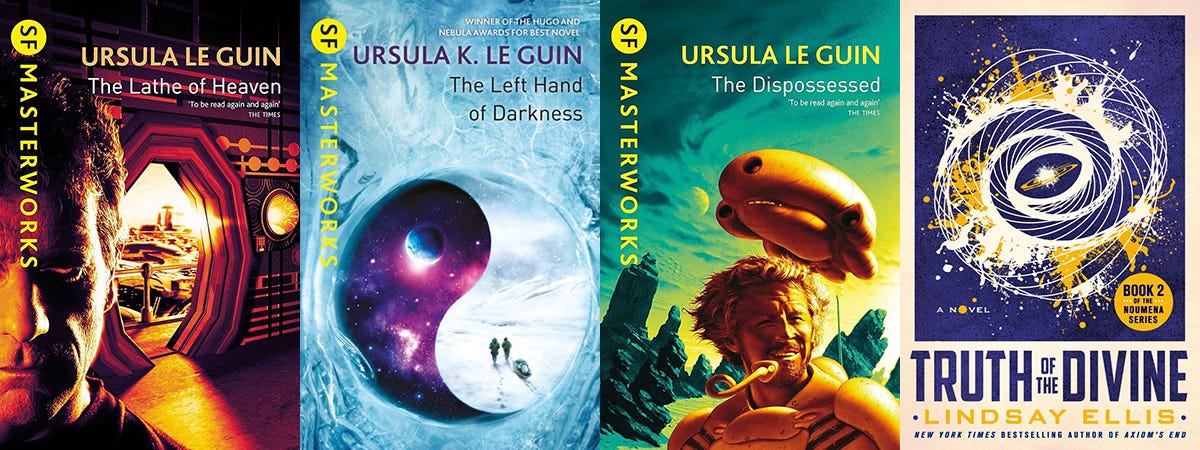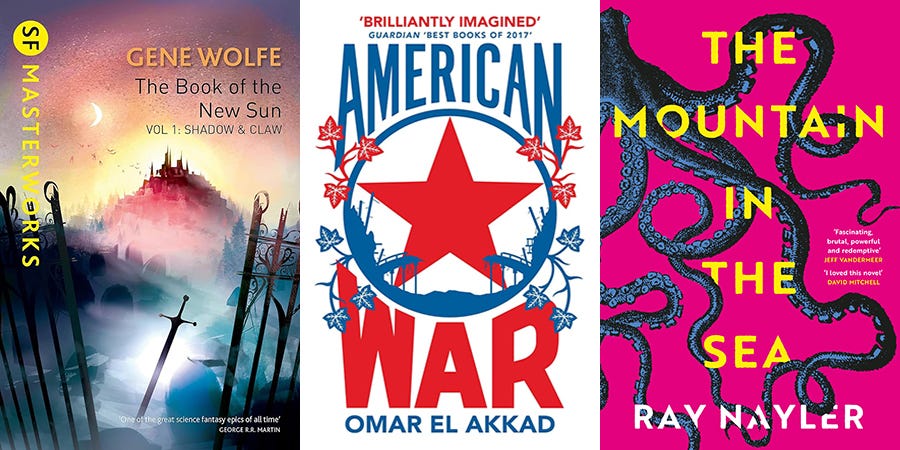Word Salad: Everything I Read in 2023 – Part I
Or, The Fleeting Thrill of Distractions on a Sinking Ship
Did I hit my reading goal for 2023? No. Am I a little bummed about this outcome, for the second year in a row no less? Sure. Will this stop me from reading more next year and waffling on about my reads in this newsletter? Absolutely not.
So, once again, with my sob story out of the way, here are all the fiction books I read last year. What was your favourite book? Did you hit your reading goals for the year? Let me know down below. Enjoy!
(Speculative) Fiction
Ursula K. Le Guin – The Lathe of Heaven (1971) / The Left Hand of Darkness (1969) / The Dispossessed (1974)
It’s likely some form of crime that it took me until 2023 to read a few seminal works from prolific Hugo & Nebula-award-winning author Ursula K. Le Guin (1929–2018). Le Guin’s name is synonymous with deeply philosophical, thought-provoking speculative fiction, and her ability to imagine other worlds of potential and possibility is unrivalled among her peers.
While Lathe of Heaven was an enjoyable exercise in psychedelic power and apocryphal divination, it was the two entries in Le Guin’s far-future Hainish Cycle universe that stirred my imagination. Left Hand of Darkness takes place on the remote world of Gethen, where the local population are ambisexual and have no fixed sex. This stark difference has a profound impact on Gethen culture and politics, making it difficult for Terra agent Genly Ai to broker a treaty of galactic peace and cooperation. Le Guin uses ideas of gender fluidity and androgyny to explore human connection and loneliness in ways that are perhaps more relevant now than ever.
Meanwhile, The Dispossessed was just as provocative and inspiring as its reputation had led me to believe. Le Guin’s incredible novel is a tale of two systems: orbiting the star Tau Ceti is the planet Urras, home to the patriarchal capitalist superpower A-Io, and its moon Anarres, the location of an Odonian anarcho-syndicalist settlement that fled Urras in rebellion over 200 years ago. At its core, Dispossessed is about ideological conflict and how better worlds are possible but not given—they will be contested and must therefore defended. If you want a sci-fi story of real, tangible hope and change, where collectivism, utopianism, and revolution take centre stage, this is for you.
Lindsay Ellis – Truth of the Divine (2021)
Back in 2021, I talked about Axiom’s End—the first part in Ellis’ ongoing Noumena series—and how the story conjured up an intriguing alternate history premise involving first contact, alien otherness, and philosophical notions of personhood.
In Part 2 of the series, the big secret is out. Human civilization is not alone in the universe, and it turns out the paranoid Bush-era public of the mid-2000s isn’t great at dealing with extraterrestrial fallout. The bond between Cora and Ampersand continues to be tested, as government agents and alien officials manipulate increasingly tense events for their benefit. It’s a gripping addition to Ellis’ larger story and I’m pumped to read the next chapter.
Gene Wolfe – The Book of the New Sun (Vol. I & II) (1980–81)
Similar to the Hellaconia trilogy I read last year, Wolfe’s tetralogy sits firmly in the camp of elevated high fantasy with a meta-science fiction frame. The story follows Severian, a young torturer forced into exile and destined to wander the world of Urth.
While I only read the first two volumes, The Shadow of the Torturer and The Claw of the Conciliator, I enjoyed the little clues Wolfe weaves as to the origins of Urth and the fallen realms of the Commonwealth and Ascia. The idea of a “Dying Earth,” and an all-too-familiar environment ravaged by the wrath of time is already curious enough, making for a fitting setting for literary adventure, fantasy tropes, and thinly veiled Christ allegories.
Omar El Akkad – American War (2018)
For the last few weeks, internet dwellers have been melting down about the trailer for director Alex Garland’s upcoming feature and its “unlikely” postulate of state alliances in the Second American Civil War. As strange as this may seem, there’s certainly *cough cough* historical precedent here, so it’s hardly surprising that conflict surrounding insurrection feels both culturally relevant and politically viable:
Thankfully, Omar El Akkad’s novelisation of just such a conflict takes a less sensationalist route, positing an eerie and violent near-future United States riven by fossil fuel restrictions, political assassinations, secessionist rebellion, climate change disruption, rogue drone strikes, deadly viral weapons, and forced detention camps for “displaced persons.” It’s a book as harrowing as it is perceptive. Let’s hope Garland’s fictional effort can strike a similar tone.
Ray Nayler – The Mountain in the Sea (2022)
When I’m not trying to catch up on seminal works from authors like Le Guin and Wolfe, I turn to more recent books and try to expand my library with newer voices. I came across Nayler’s novel after seeing praise-worthy quotes from other authors on my shelves like Ann Leckie, David Mitchell, and Jeff VanderMeer.
Set on an island in the Vietnamese Côn Đảo archipelago, The Mountain in the Sea is a near-future tech thriller bristling with big ideas: transnational intrigue, the malleability of language, extrahuman intelligence, and the vulnerability of ecology. I’ve always been curious about cephalopods, philosophy, and the nature of consciousness, and Nayler bundles these engaging threads together in a way that I’ve been reflecting on for months afterwards. A stunning debut.
Here’s a link to Nayler’s chat with The Chris Hedges Report:





